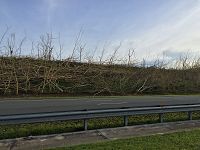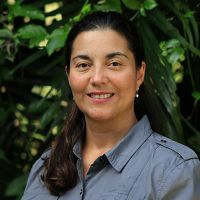Assessing The Damage To Puerto Rico’s Rain Forest
30 Oct 2017
News Source: NPR
The trees in the El Yunque National Forest in Puerto Rico were raked bare by Hurricane Maria. Grizelle Gonzalez talks with NPR's Melissa Block.
MELISSA BLOCK, HOST:
In Puerto Rico, the trees in the once-lush El Yunque National Forest were raked bare by Hurricane Maria. The tropical rain forest is one of the most popular destinations on the island - famous for its biodiversity with many species found nowhere else on Earth. It's home to more than 240 species of trees, dozens of bird species, and the forest's rainfall supplies 20 percent of the territory's drinkable water.
Dr. Grizelle Gonzalez has worked in El Yunque for 25 years. She's project leader of the International Institute of Tropical Forestry, and she spent this week traveling through the forest and assessing the damage. She joins us now from San Juan. Dr. Gonzalez, welcome to the program.
GRIZELLE GONZALEZ: Thank you.
BLOCK: And why don't you describe what you saw as you went through El Yunque this week?
GONZALEZ: Many of the trees were completely defoliated. It's crunchy leaves. It's trees uprooted. You see the moss has all dried. So it's a shock to the system. And it takes many, many years - could be a century or two when we see full recovery of tree species on those areas.
BLOCK: What about all of the animal life? Could you tell how badly it was affected if things survived?
GONZALEZ: We saw some birds that had died. And then, days later, we were able to see some of the birds kind of flying around. They're very, very visual because they have these bright greens and colors that you can pick up from the brown background. And they are just scavenging for fruits right now.
BLOCK: We mentioned that Puerto Rico depends heavily on rainfall coming through El Yunque. How does the defoliation of all the trees there affect the water supply?
GONZALEZ: Yes. At the top of the mountains, we have cloud forests. These are forests composed of trees of low stature. They have the ability to withstand the strong wind conditions at the top of the mountain. They are very important in regulating the water cycling of the mountain and actually supplying the 20 percent of the water for Puerto Rico. These trees are completely covered by mosses and plants that sit on the tree trunks and collect water. And they can then kind of filter cloud water down the mountain. So many of these mosses and epiphytes were stripped from the tree trunks on the face where those winds were more intense.
BLOCK: I wonder, Dr. Gonzalez, as you were walking through El Yunque looking at the destruction of this place that you've known so well for so long, what was going through your mind seeing it totally transformed?
GONZALEZ: Well, it's an amazing experience, but I think it's one of learning and regeneration. We already have seen the greening of the forest in some areas. We're already seeing that some species are lifting up. We know that some other species will come up and kind of make their way to more native or mature species of the forest to take over. So yes, it is a catastrophic event. But we know that there's going to be a recovery phase.
BLOCK: Dr. Gonzalez, what about you and your family? How did you do? Do you have power? Do you have water?
GONZALEZ: I don't have power.
BLOCK: Yeah.
GONZALEZ: I don't have water (laughter). I don't have communications, but at least at work we have a generator. We can come to work. We feel productive.
BLOCK: And are you convinced that you will stay in Puerto Rico? Or is leaving still a possibility for you?
GONZALEZ: Well, that is always a possibility, but I will stay. There's a lot of work that needs to get done.
BLOCK: I'm sure.
GONZALEZ: We need to rebuild all the research infrastructure, all of our instruments, towers. So I feel energized to put everything back up as it was or better and keep on this mission of learning from the tropical rain forests.
BLOCK: Dr. Grizelle Gonzalez is project leader of the International Institute of Tropical Forestry. She joined us from San Juan, Puerto Rico. Dr. Gonzalez, thanks so much.
GONZALEZ: Thank you.
News Source:
READ MORE from NPR >>
News Category:
Explore Further


